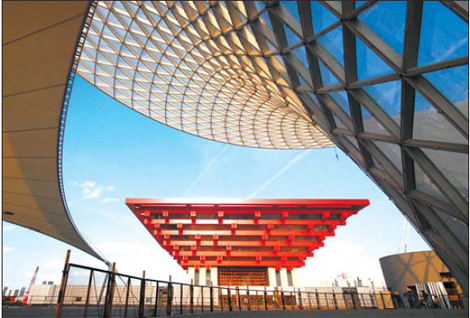
On Jan 1, a little piece of Shanghai, China, is set to roll down Colorado Boulevard in the Tournament of Roses Parade, to promote the 2010 Shanghai World Expo.
The Rose Parade is in its 121st year, but the World Expos have been going on even longer - 159 years, dating back to the first fair in London in 1851.
More than 70 million visitors are expected to visit Shanghai from May 1 to Oct 31, with 200 countries exhibiting. Though a more historical event, the Expo's exposure is not all that different from that of the Rose Parade, with 100 million people from 217 countries expected to watch the event on television.
It's not uncommon for cities to enter floats in the Rose Parade, but the Shanghai Expo float this year, and the Beijing Olympics float in 2008, are firsts for China.
Pasadena's mayor, who has traveled to China four times, sees the event as a reflection of the Rose Parade's reach.
"It's locally produced, but globally enjoyed," says Mayor Bill Bogaard.
Replicas of Shanghai's signature skyscrapers have been built to adorn the float, with action-film star Jackie Chan and other dignitaries on board, while 86 roller-skating dancers representing China's 56 ethnic groups are flying in from Shanghai to perform on skates around the moving monument.
The float has its origins in a group of men and women who are part of Southern California's Chinese-American community.
Sue Zhang, chair of the Roundtable of Southern California Chinese-American Organizations, traveled several times to China this year to convince organizers that the Rose Parade was worth the effort.
An engineer by trade, Zhang went to the United States as a visiting scholar in 1981 and decided to stay.
It took some convincing on Zhang's part to show that Pasadena was important to expo officials, who had their minds on Paris and New York.
"They are not in Los Angeles," she says. "They don't understand how good the Rose Parade is. They said 'why?' They think about the whole world, why would they put their energy into the US and Southern California?"
Once Zhang got permission from Beijing to use the Expo logo and slogan, and the Shanghai Information Office was on board, the Chinese consulate in Los Angeles also helped facilitate the Shanghai float's participation in the Pasadena parade.
"The Rose Parade is a celebration of different cultures, and also I believe it's a very good opportunity for various cultures around the world to know each other," says deputy consul general Sun Weide, in an interview with China Daily US Edition.
Next, Zhang had to find a way to pay for the project. Luckily she had some practice the last time she put a float in the Rose Parade, to promote the Beijing Olympics.
For the $400,000 Olympic float, Zhang found a sponsor in Pasadena-based office-products manufacturer Avery Dennison. For the Shanghai Expo, the budget is slightly smaller, at $340,000.
"Instead of five mascots for the Olympics, the Expo only has one mascot - Haibao," Zhang says with a smile.
Zhang and her colleagues were able to meet the budget by dividing sponsorships among the roundtable's member organizations, as well as the New York City-based Committee of 100.
The group is a national organization founded by I.M. Pei, Yo Yo Ma and other influential Chinese-Americans. Members work to foster good relations between the United States and China and encourage "the full participation of Chinese-Americans in all aspects of American life".
Under the theme "Better City, Better Life," the Shanghai World Expo aims to offer the best practices of each exhibiting country, with an eye toward harmony between people and nature.
It will be the first time that a World Expo is held in a developing country, organizers say, and it promises an unprecedented use of renewable energy and green standards.
Zhang and her colleague, roundtable vice supervisor Charles Lu, want to do their part in showing Americans what China is all about.
Lu says: "Chinese people in China know more about the United States than Americans know about China. With a big event like this, we can get more understanding of each other."
Chinese are similar to Americans, he adds, when it comes down to the basics.
"They are very traditional," he says. "They care about family. It's very simple, they want to make money for a better life."
There's also the global picture of China and the US as world leaders in a time of uncertainty.
"Right now, China and the US are two big, very strong countries," Zhang says. "If you want the whole world to have peace, America and China have to get together. We are friends. We are not enemies. We are not competition."
Source: People's Daily Online

0 comments:
Post a Comment
COMMENTS HAVE BEEN SWITCHED OFF
Note: Only a member of this blog may post a comment.